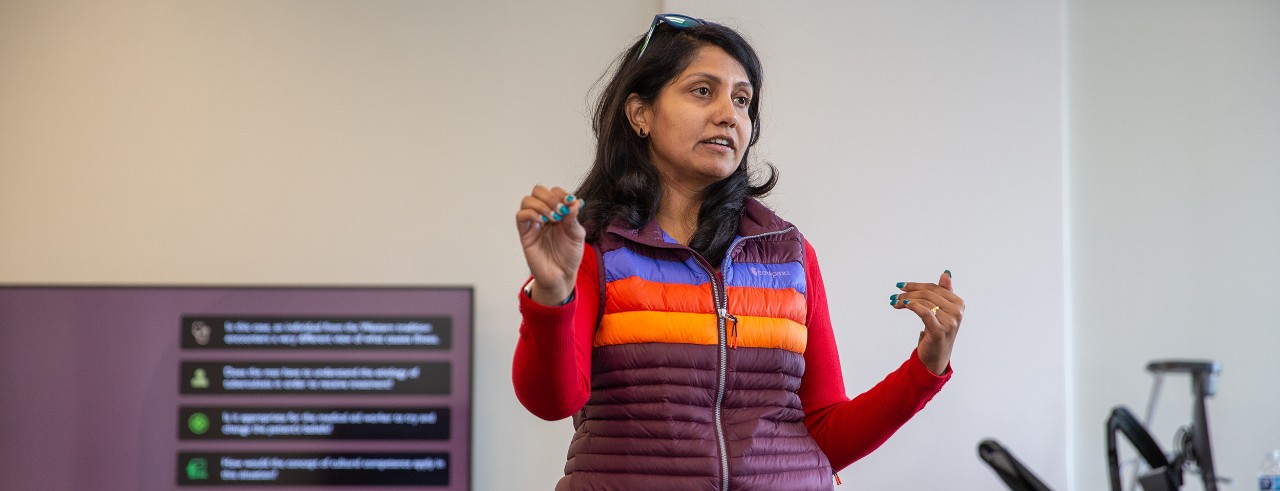
UC offers four new undergraduate concentrations in public health
Revamped program allows students to focus on their interests, strengths
The University of Cincinnati has added four new undergraduate concentrations in public health.
The Bachelor of Science in public health program, housed within the College of Medicine, is interdisciplinary, with instructors from nine colleges on UC’s main campus and two regional campuses.
This semester, new concentrations are available for students to focus on their interests and strengths:
- Global health
- Health administration
- Health promotion and education
- Urban systems design
About 180 students are currently enrolled in the undergraduate program, with about 25 students in the undergraduate public health concentration. They have the option to major or minor in public health.
All of the concentrations except urban systems design are offered both in person and online. The online-only program is asynchronous, meaning students can complete schoolwork at hours of the day that are most convenient for them. The global health concentration, for example, has six courses designed to be taken in about two years’ time.
“We need to have a system that nurtures students’ ability to grow and change and find their niche during their four years of undergraduate education, and that is what these concentrations are moving toward,” said Anil Menon, PhD, associate dean of undergraduate education in the College of Medicine. “These offerings give students a path forward.”
Feedback has been positive.
“The students are very enthusiastic about these new offerings,” said Priyanka Gudsoorkar, BDS, MBA, MPH, assistant professor-educator in the Department of Environmental and Public Health Sciences in the College of Medicine and director of the global health concentration. “We have seen a lot of interest in global health at the undergraduate level.”
That interest includes international and transfer students.
“It’s a unique focus. Most universities in the U.S. don’t have global health or urban systems design at the undergraduate level, so these concentrations are innovative for UC,” said Regan Johnson, MEd, MCHES, associate professor-educator in the School of Human Services in the College of Education, Criminal Justice and Human Services and director of the undergraduate public health program.

Students work together in Priyanka Gudsoorkar's undergraduate public health course, Global Health Dynamics. Photo/Andrew Higley/UC Marketing + Brand.
She said many of the students currently enrolled in the public health program are non-traditional students who work full-time, creating a diverse student population.
Students who are interested in human services, social justice and helping populations as a whole might find it suits them.
“These are ideal choices for students who know they want to help people but maybe are not sure how they want to help. Maybe they know they want to go into a health field, but public health is not as STEM-focused as medicine,” said Johnson.
“These courses are designed for hands-on, real-life experiences instead of only reading age-old texts,” said Gudsoorkar.
Along with those experiences, study abroad opportunities are available.
The first trip the program will take will be to Lisbon, Portugal, in the summer of 2025, but eventually students will have the opportunity to travel to Cuba as well. Yearly trips to sites in Ghana and Tanzania are also planned. Students in the concentration will have opportunities to study global health in both developed and underdeveloped countries.
The trips will create partnerships and build collaborations that will benefit the program as a whole, enriching educational materials, data assessments and virtual work for all students.
“Global health is about a human-to-human connection, making the world a better place and less prone to wars and political instability,” said Menon.
Johnson said graduates can work in the public health field with a four-year degree, finding employment at public health departments, nonprofit organizations and government agencies and in employee wellness programs.
Others go on to Master of Public Health or Doctor of Medicine programs.
College of Medicine undergraduate certificate programs
The College of Medicine has two undergraduate or baccalaureate programs: public health and medical sciences. One is more focused on preventative health, while the other is focused on interventional health, Menon explained.
The college offers a number of undergraduate certificate programs, including:
- Anatomical sciences
- Clinical and translational research
- Medical informatics
- Integrative health and wellness
Students can also earn a minor in integrative health and wellness.
“These certificates are like micro-credentials for students. Before long, they are leaders in the field. So we are setting them up for the long arc of success,” said Menon.
Featured image at top: Priyanka Gudsoorkar, BDS, MBA, MPH, teaches an undergraduate public health course, Global Health Dynamics. Photo/Andrew Higley/UC Marketing + Brand.
Tags
- College of Pharmacy
- College of Medicine
- College of Arts and Sciences
- College of Allied Health Sciences
- College of Cooperative Education and Professional Studies
- Health
- College of Education, Criminal Justice, & Human Services
- Online
- Faculty Staff
- Blue Ash College
- Clermont College
- College of Design, Architecture, Art, and Planning
- Environmental Health
- College of Nursing
Related Stories
UC offers four new undergraduate concentrations in public health
October 29, 2024
The University of Cincinnati’s Bachelor of Science in public health program has four new concentrations for students: global health, health promotion and education, health administration, and urban systems design.
2023: A year in review
December 15, 2023
Review the University of Cincinnati's historic and productive year in 2023 through our year-in-review website.
UC Day of Giving spotlights strength of Bearcat unity
April 4, 2023
UC Day of Giving, the University of Cincinnati’s annual 24-hour celebration of community and philanthropy, is back and will run from noon on Tuesday, April 18, through noon on Wednesday April 19.
